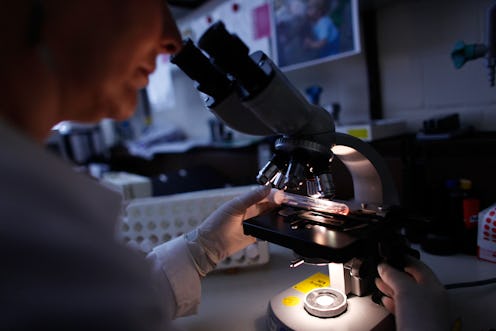News
You May Have Inherited Your Grandparents' Trauma
According to new research, there's a possibility that the effects of trauma could be passed on to future generations via sperm. A mice study in Switzerland found that the offspring of traumatized mice were more likely to develop health problems down the line, such as depression, schizophrenia, and even obesity.
Passing on effects of a lifestyle to future generations is known as epigenetic inheritance. The lifestyle effects don't make any changes to the actual genetic code, which is why scientists have been baffled for so long about how they can actually transfer from one generation to another.
But a team of scientist at the University of Zurich in Switzerland, led by Isabelle Mansuy, has identified a mechanism in mice that may hold the key to the mystery. The study, published this month in Nature Neuroscience, found that traumatic stress in early life altered the expression of mouse microRNA (miRNA) — tiny fragments of genetic material that don't encode proteins — in the brains and blood of the mice tested.
Trauma produced excess amount of miRNA, and an abnormal dip in the production of certain proteins, causing changes in behavior and metabolic responses.
Mansuy and her team of researchers discovered an abnormally high number of miRNA molecules in the sperm of adult mice who had been traumatized in early life through separation from their mothers at birth. These mice ended up both more daring and more despairing that their peers. The mice took half the time of the other mice to start exploring new avenues and lighted spaces, but gave up much sooner in a swimming endurance test.
The researchers discovered the same excess molecules — and the same behavior traits — in both the children and the grandchildren of the traumatized mice. Mansuy even double-checked this by taking purified extracts of miRNA from the stressed mice and injecting them into normal mouse embryos. She got the same result.
Mansuy suspects there's a good chance lifestyle effects can be passed down the female line in a similar way — immature female eggs also contain miRNAs — but the team has yet to investigate this.
There's still a lot more research to be done. For example, it's not yet known how the excess miRNAs, which are originally present in the brain, get into the sperm. There is also a disconnect between generations. Although the third generation of mice displayed the same behavior traits as the second and first generation traumatized mice, there were no signs of excessive miRNA in the sperm of the second generation mice. This raises the possibility that the trauma is transferred into a different non-genetic marker between generations.
